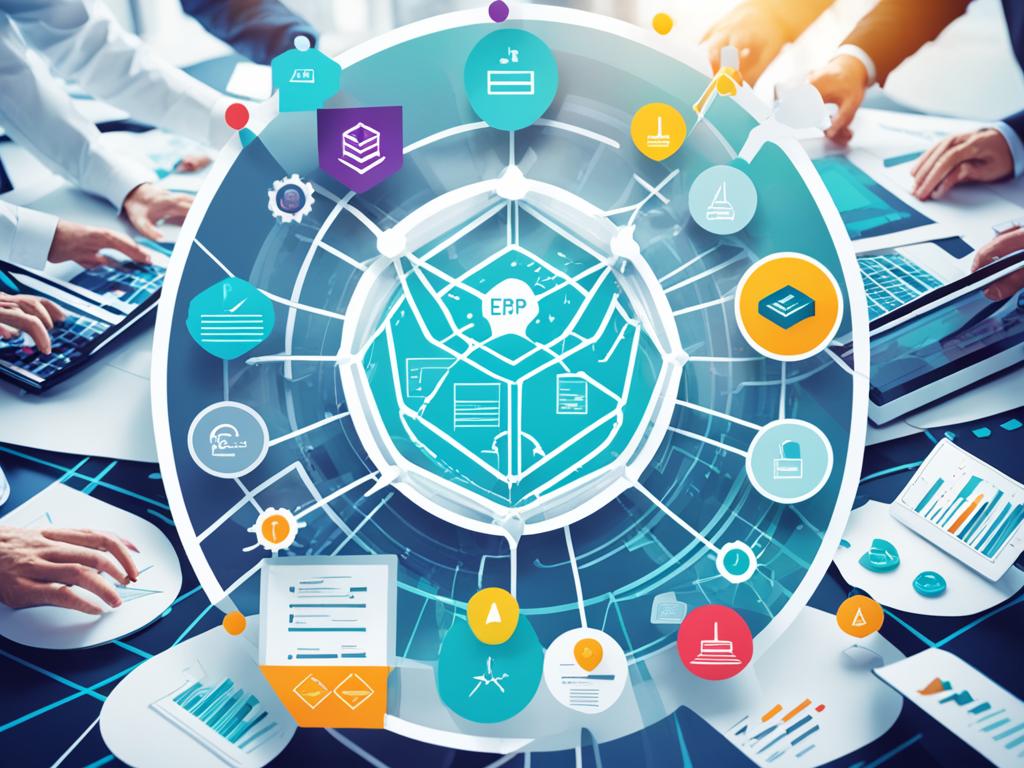Did you know that the enterprise resource planning (ERP) market is expected to reach a staggering $78.40 billion by 2026? With businesses across all industries realizing the importance of efficient and integrated software systems, ERP has become a vital tool for managing complex processes, ensuring seamless operations, and driving growth.
But with so many ERP software options available, how do you choose the right one for your enterprise?
Key Takeaways:
- ERP software is critical for streamlining business operations and achieving efficiency in large enterprises.
- The top ERP vendors, including SAP, Oracle, Microsoft, and Workday, offer a wide range of customizable solutions for global operations and multi-site businesses.
- Choosing the right ERP software involves evaluating factors such as cloud strategy, scalability, and industry-specific modules.
- The benefits of ERP software include improved productivity, better decision-making, and reduced costs.
- Stay informed about the evolving ERP market and the different options available to make an informed decision for your enterprise.
The Benefits and Types of ERP software
When it comes to managing enterprise resources and improving business operations, ERP software emerges as a powerful solution. With its wide range of benefits and different types of systems available, ERP software has become an essential tool for organizations across various industries.
Let’s explore the key advantages of ERP software and the main types of ERP systems:
The Benefits of ERP Software
- Streamlining Business Operations: ERP software enables organizations to streamline their business processes by integrating various departments and functions into a unified system. This enhances efficiency, reduces manual effort, and eliminates redundant tasks.
- Enhancing Efficiency: By automating repetitive tasks, ERP software saves valuable time and increases productivity. It optimizes resource allocation, reduces operational costs, and improves overall efficiency.
- Improving Data Accuracy: With ERP software, data is stored in a centralized database, ensuring consistency and accuracy across different departments. This eliminates data silos, reduces the risk of errors, and provides real-time access to reliable information.
- Enabling Better Decision-Making: ERP software offers comprehensive reporting and analytics capabilities, providing valuable insights for decision-making. It generates actionable data, facilitates data-driven decision-making, and supports strategic planning.
- Increasing Collaboration: ERP software promotes collaboration among teams by creating a shared platform for communication and information sharing. It improves cross-departmental collaboration and enables better teamwork.
Main Types of ERP Systems
ERP systems can be categorized into three main types:
- On-Premises ERP: These systems are installed and operated on servers located within the organization’s premises. On-premises ERP provides complete control over data security and customization but requires a dedicated IT infrastructure.
- Cloud-Based ERP: Cloud-based ERP systems are hosted on the provider’s servers and accessed via the internet. They offer scalability, easy accessibility, and reduced IT maintenance costs. Organizations can enjoy the benefits of real-time updates and flexible deployment options.
- Hybrid ERP: Hybrid ERP systems combine elements of both on-premises and cloud-based solutions. They allow organizations to maintain critical data on-premises while utilizing cloud-based applications for specific functionalities. Hybrid ERP offers the flexibility to choose the deployment model that best suits the organization’s needs.
The choice of ERP system depends on various factors, including the organization’s size, industry, budget, and specific requirements. Consulting with ERP experts and evaluating the pros and cons of each type will help organizations make an informed decision.
The functionality of ERP software is delivered through modules that address specific business processes. Let’s take a look at the most common ERP modules:
- Finance and Accounting
- Human Resources
- Supply Chain Management
- Manufacturing
- Customer Relationship Management
- Business Intelligence
These modules form the core functionalities of an ERP system and can be further customized to cater to the unique needs of different enterprises.
With the numerous benefits it offers and the flexibility it provides, ERP software has become an indispensable tool for modern businesses. By leveraging the power of ERP systems and their modules, enterprises can effectively manage their resources, streamline operations, and drive growth.
Conclusion
Choosing the right ERP software for your enterprise is crucial for streamlining business operations and achieving efficiency. With the increasing demand for flexible and cloud-based solutions, the ERP market has evolved to meet the changing needs of businesses.
When it comes to top ERP software vendors, industry leaders like SAP, Oracle, Microsoft, and Workday offer a wide range of options for enterprises of all sizes and industries. These vendors provide comprehensive solutions that can cater to the specific needs of your business.
ERP software brings numerous benefits to enterprises, including improved productivity, better decision-making, reduced costs, increased customer satisfaction, and enhanced competitiveness. By centralizing and automating key business processes, ERP software enables organizations to optimize their operations and drive growth.
When selecting an ERP software, consider the specific requirements of your enterprise and assess the features and functionalities offered by different vendors. This will help you make an informed decision and choose the right ERP software that aligns with your business goals.


1 thought on “10 Largest ERP vendors today”
Comments are closed.